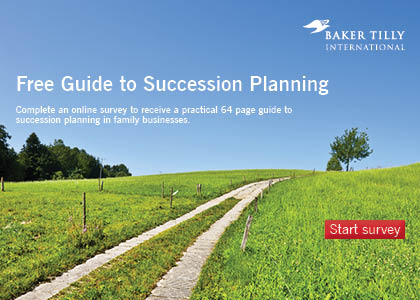Succession is a dynamic journey, and anyone involved in this process should seek to understand it before venturing forward. Below, Richard Shrapnel explores the journey of succession.
Succession is a journey that preferably commences the day you start your business but often only starts when an owner decides it is time to sell or transfer control of the business.
This journey typically commences with a trigger, something that has initiated the decision to start the succession process. With this commencement the owner usually forms some initial considerations, and the outcomes they are seeking which hopefully guide their journey. There are of course the inevitable challenges and obstacles that arise when pursuing any goal, which some owners manage better than others. At the end of the process they look back and reflect on their journey, the goals they have achieved and how closely they match their initial aims, the lessons they have learnt and what they would do if they had their time again.
This is the journey of succession that anyone involved in this process should seek to understand before venturing forward. This is the journey that this article explores.
Succession Research
The global accounting and business advisory network Baker Tilly International, in cooperation with Swinburne University, has continued its research of Business Succession and has now released its interim findings based upon the initial analysis of global survey responses to date. Some 2400 persons have undertaken this survey so far, with approximately 1650 persons having substantially completed the various questions in the survey. The survey has been made available in nine languages to date by member firms of Baker Tilly International. The research of which this survey forms a part is unique in a number of aspects:
• It is structured to focus on the dynamics, barriers and success strategies experienced in a succession process;
• It considers respondents’ experiences from the three perspectives of having completed a succession process, being in the midst of a succession process and not yet commenced, and therefore provides alternate perspectives of how experience varies across the journey of succession;
• It is focused solely on the issue of succession and is not part of a general family business survey, and;
• It is a global survey that is being conducted across some 55 countries in nine languages.
A full copy of the Interim Findings of the Global Survey including relevant statistics and a profile of the respondents to the survey may be downloaded from www.bakertillyinternational.com
What are the triggers for a business to commence succession?
The most prominent trigger is the ‘readiness of the present owners to step down’ followed closely by the ‘readiness of the next generation to step up’, with each trigger likely to be dependent upon the other in many instances.
For those who had not yet commenced succession, whilst they recognised that ‘readiness’ would be a key trigger, they also believed that ‘health issues’ or a ‘death in the family’ would be a prime trigger. However, it appears that experience does not hold this true, with those respondents who had completed succession or in progress not ranking these triggers highly.
Interestingly, ‘advice from external advisors regarding taxation or estate planning’ appeared to be a material trigger to commence succession, but there is a question as to whether this advice may have been client initiated. Divorce was not seen as a significant trigger for succession at any stage.
The ‘lack of a family successor’ only arose as a trigger for owners who had already commenced the process and therefore seems to be more of a challenge and possibly an influence on alternate outcomes rather than a trigger.
At the outset, what were the most important considerations in the succession process?
For those owners who had concluded their succession process and those who were still in progress, there was a clear alignment across the most important considerations. ‘Continuity of the business’ and ‘ongoing jobs for employees’ were the most important considerations in the succession process. Maintaining ‘family harmony’ was also an equally important consideration, however, ‘keeping the business in the family’ was relatively unimportant.
Obtaining the ‘best price for the business’ achieved almost equal ranking of importance as ‘continuity’, ‘ongoing jobs’ and ‘harmony’ for those persons who had not yet commenced succession, but it diminished as succession progressed to become the least important consideration.
What would you have described as the principal outcome sought?
The establishment of clear outcomes or goals for the succession process at its commencement is a key to creating ‘readiness’, and as highlighted previously is an important trigger. Readiness is about willingness and eagerness to engage in the process.
In simple language, it would seem that if you know where you want to go and you have a compelling reason to get there, then the journey is much easier to start and far simpler to complete.
87% of respondents who stated they had established a ‘principal outcome’ at the commencement of their succession journey reported they had achieved that outcome.
How would you describe the most critical challenges that you faced?
The financial capacity of the business and equity among family members appear to be the greatest challenges addressed during the succession process. ‘Financial capacity’ reflected itself in three ways – the capacity of the business to produce an adequate return, capacity to support retirement and capacity to support the next generation.
Achieving a ‘fair distribution of assets among family members’ was, however, the single greatest challenge faced in the succession process. It is important to note that this is not an equal distribution but rather a fair or equitable distribution after taking into account family members’ participation in the business.
Where a respondent had not yet commenced a succession process, the greatest expected challenges were around how succession would work in their circumstances. The problems associated with fair distribution were not anticipated to be a challenge.
Who did you involve in the succession process?
There was no clear pattern as to which family members were involved in succession processes as this clearly turns upon the make-up of a family, their involvement in the business and family relationships. However, what can be said is that there is a belief that good decisions about family succession can be made collectively and that family succession can be planned, although the more persons engaged in the process the more complex it becomes.
There was also a clear confirmation that sons are not the natural heirs to a business and that the eldest child is not assumed to be the natural family leader of the business.
Who was your most trusted advisor through the process?
Respondents used a range of persons to support and advise them in the development of their succession plan. Accountants represented the most commonly trusted advisor, followed by spouse or partner and then legal advisors. However, when considering all the various family members, over one third of respondents turned to a family member for advice rather than seeking external professional advice.
What role did your spouse play in the process?
Across all stages of the succession process, spouses were principally concerned with ensuring that family harmony was maintained.
Spouses were focused on the need for clarity around ownership and inheritance for the incoming generation and also a fair inheritance for family members not involved in the process. They were also conscious of the need to ensure the next generation does not feel pressured to take over.
What degree of conflict did you encounter during the succession process?
15% of respondents felt the process had caused substantial conflict within their family. Despite this, 96% of respondents who had completed their succession process were satisfied with the outcome achieved, and over 75% believed the majority of family members supported the outcome.
It is also worth noting that whilst the family business was often considered a legacy for the future generations, a sale of the business was still strongly felt to be a real option.
Key Findings – Recommended Response
In communicating our Key Findings, we have taken what some may consider an unusual approach. We have not sought to summarise the research by providing a statistical analysis, rather we have set out what we believe is the response to these results. That is, given these findings, what does it mean to the way you conduct your succession process? We have described our response as the Eight Principles of Succession:
• Principle 1: Succession Is Not Retirement
• Principle 2: Start With Readiness
• Principle 3: Set Your Goals Before The Journey
• Principle 4: Harmony Is A Must
• Principle 5: Price Is Not First
• Principle 6: Plan Early Start Earlier
• Principle 7: Equality Is Not Equal
• Principle 8: Ask Before You Get Lost
In our next article we will expand upon each of these eight principles.
Ongoing Research
The research and survey are still continuing until 30 June 2014 and you may participate by following anyone of these links:
English (international): https://www.research.net/s/BTISuccessionSurvey
English (USA): https://www.research.net/s/BTISuccessionSurveyUSA
Chinese: https://www.research.net/s/BTISuccessionSurveyChinese
Dutch: https://www.research.net/s/BTISuccessionSurveyDutch
French: https://fr.research.net/s/BTISuccessionSurveyFrench
Korean: https://www.research.net/s/BTISuccessionSurveyKorean
Portuguese: https://pt.research.net/s/BTISuccessionSurveyPortuguese
Russian: https://www.research.net/s/BTISuccessionSurveyRussian
Spanish (Europe): https://es.research.net/s/BTISuccessionSurveySpanishEU
Spanish (Latin America): https://es.research.net/s/BTISuccessionSurveySpanish
About the Author
Dr Richard Shrapnel PhD is a partner/executive director of Baker Tilly Pitcher Partners, Melbourne, Australia, an independent member of Baker Tilly International – the world’s 8th largest accounting and business advisory network by combined revenue of its member firms. Richard is a business strategist and one of the three chief investigators undertaking the three-year succession research project in partnership with Swinburne University.




































